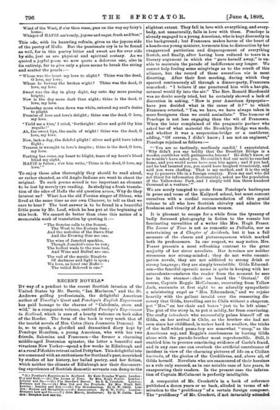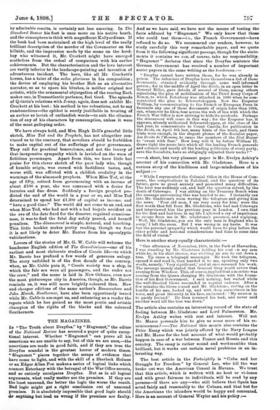RECENT NOVELS.*
33v way of a pendant to the recent Scottish invasion of the United States by Mr. Barrie, "Ian Maclaren," and the St. Andrews golfing professionals, the delightful American author of Timothy's Quest and Penelope's English Experiences has paid homage to the charms of "Caledonia, stern and wild," in a companion volume, entitled Penelope's Expriences in Scotland, which is sure of a hearty welcome on both sides of the Border. The form of the book is very much that of the tourist novels of Mrs. Cotes (Sara Jeannette Duncan) It is, so to speak, a glorified and dramatised diary kept by Penelope Hamilton, a young American, who with her two friends, Salemina and Francesca—the former a charming middle-aged Bostonian spinster, the latter a beautiful and .vivacious New Yorker—spend a few weeks in Edinburgh and at a rural Fifeshi re retreat called Pettybaw. This delightful trio are consumed with an enthusiasm for Scotland's past, nourished by studies of her history, her ballad poetry, and her fiction, which neither the climate of Edinburgh nor their disconcert- ing experiences of Scottish domestic servants can damp to the • (1.) Penelope. Eaperienc.. in Scotland. By Kate Douglas Wiggin. London: ta,y and Bird.—(2.) The Looms of Time. By Mrs. Hugh Fraser. London : lebister and Co.—(3.1 Th. Standard Bawer. By S. B.. Crockett. London; Methuen and Co.—(4.) Miss Tod and the Prophets. By Mrs. Hugh Bell. London : Bentley and Son.—(5.) Th. Grandissimes. By G. W. Cable. Lon- don Hodder and Stoughton.—t6.) Bonarenture. By G. W. Cable. London : Sampson Low and Co.—i7.) John Yank South/num. By G. W. Cable, Lon- -Ilan: Sampson Low and Qv.
slightest extent. They fall in love with everything, and every- body, not unnaturally, falls in love with them. Penelope is already engaged to a young American, who is kept discreetly in the background ; but Francesca makes havoc of the heart of a handsome young minister, torments him to distraction by her exaggerated patriotism and disparagement of everything Scotch, and finally, after having been reduced to tears in a literary argument in which she "gave herself away," is un- able to maintain the parade of indifference any longer. We cannot help feeling some misgivings as to the result of this alliance, but the record of these amantium viz is most diverting. After their first meeting, daring which they sparred continuously all through a dinner-party, Francesca remarked : "I believe if one punctured him with a hat-pin, oatmeal would fly into the air." The Rev. Ronald Macdonald was no doubt sorely tried, but he certainly showed a lack of discretion in asking, "How is your American dyspepsia— have you decided what is the cause of it ? " to which Francesca retorted, "Yes, we have, we have always taken in more foreigners than we could assimilate." The humour of Penelope is not less engaging than the wit of Francesca. When the later complained of the pragmatic partner who asked her of what material the Brooklyn Bridge was made, and whether it was a suspension-bridge or a cantilever, adding, "Of course, I didn't know ; I am not an engineer," Penelope rejoined as follows :—
"' You are so tactlessly, needlessly candid,' I expostulated. 'Why didn't you say boldly that the Brooklyn Bridge is a wooden cantilever with gnttapercha braces ? He didn't know, or he wouldn't have asked you. He couldn't find out until he reached home, and you would never have seen him again ; and if you had, and he had taunted you, you could have laughed vivaciously, and said you were chaffing. That is my method, and it is the only way to preserve life in a foreign country. Even my earl who did not thirst for information (fortunately), asked me the population of the Yellowstone Park, and I simply told him three hundred thousand at a venture.'" We are sorely tempted to quote from Penelope's burlesques in prose and verse of the Kailyard school, but must content ourselves with a cordial recommendation of this genial
volume to all who love Scottish chivalry and admire the freshness and vivacity of American women.
It is pleasant to escape for a while from the tyranny of badly focussed photography in fiction to the roseate but fascinating unrealities of a writer like Mrs. Hugh Fraser. The Looms of Time is not as romantic as Palladia, nor as entertaining as A Chapter of Accidents, but it has a full measure of the charm and picturesqueness which marked both its predecessors. In one respect, we may notice, Mrs.
Fraser presents a most refreshing contrast to the great majority of her sister novelists. Her laeoines are neither strenuous ncr strong-minded ; they do not write emanci- pation novels, they are not addicted to strong drink or strong language ; they are simply irresistible. Gilds. Edmund- son—the fanciful operatic name is quite in keeping with her antecedents—enslaves the reader from the moment he sees her in the steamer - chair on board the Orotaxi.' Of course, Captain Reggie McCalmont, recovering from Yellow Jack, succumbs at first sight to so adorably sympathetic a ministering angel as "Mrs. Edmundson," and we rejoice heartily with the gallant invalid over the reassuring dis- covery that Gilda, travelling out to Chile without a chaperon,
put "Mrs." on her chair and boxes just to be left alone." The plot of the story is, to put it mildly, far from convincing. The crafty intendente who successfully palms himself off on Gilda, on her arrival in Chile, as the brother she had not seen since her childhood, is rather hard to swallow, the tricks of the half-witted puma-boy are somewhat "steep," as the Americans say, and Reggie's carelessness in leaving Gilda alone with the pseudo-brother most reprehensible. Still, it
enabled him to procure convincing evidence of Carlo's fraud, and in any case one can overlook the artificial contrivance of incident in view of the charming pictures of life on a Chilian hacienda, of the glories of the Cordilleras, and, above all, of
Gilda herself. Novelists who are enamoured of their heroines as a rule only succeed, as in one notable case of late years, in exasperating their readers. In the present case the infatua-
tion of Captain McCalmont is perfectly intelligible.
A compatriot of Mr. Crockett's in a book of reference published a dozen years or so back, alluded in terms of ad- miration to the "prolificacy" of a certain foreign composer.
The "prolificacy " of Mr. Crockett, if not invariably attended by admirable results, is certainly not less amazing. In The Standard Bearer his foot is once more on his native heath, and the atmosphere is thick with magnificent Kailyardisms. If the book had been maintained at the high level of the really brilliant description of the murder of the Covenanter on the hillside, and the impression made by the scene on the herd. boy who witnessed it, Mr. Crockett might have emerged scatheless from the ordeal of comparison with his earlier achievements. But the characterisation and the love interest are vastly inferior to the landscape-painting and invention of adventurous incident. The hero, like all Mr. Crockett's heroes, has a taint of the miles gloriosus in his composition ; the device of employing his brother Hob as an alternative narrator, so as to spare his blushes, is neither original nor artistic, while the ornamental objurgation of the roaring Earl, makes one, in Transatlantic parlance, feel tired. The episode of Quintin's relations with Jenny, again, does not exhibit Mr. Crockett at his best : his method is too robustious, not to nay rumbunctious—the epithet is surely justifiable in treating of an author so lavish of outlandish words—to suit the elimina- tion of any of his characters by consumption, unless it were of the most galloping order.
We have always held, and Mrs. Hugh Bell's graceful little sketch, Miss Tod and the Prophets, has not altogether con- vinced us to the contrary, that novelists should be forbidden to make capital out of the sufferings of poor governesses. They call for practical benevolence, and not the luxury of that inexpensive sympathy which is lavished on the woes of fictitious personages. Apart from this, we have little but praise for this clever sketch of the poor lady who, though of humble origin, was cursed with fastidious tastes, and, worse still, was afflicted with a, childish credulity in the warnings of the almanack prophets. When Miss Tod, at the age of fifty, retired from governessing with an income of about £100 a year, she was consumed with a desire for luxuries and fine dress. Suddenly a foreign prophet pre- dicted the end of the world in a year or so, and Miss Tod determined to spend her £1,300 of capital as income, and 4' have a good time." The world did not come to an end, and when Miss Tod, who had met with a bad bicycle accident on the eve of the date fixed for the disaster, regained conscious- ness, it was to find the fatal day safely passed, and herself penniless. The denouement is simple, natural, and touching. This little booklet makes pretty reading, though we fear it is not likely to deter Mr. Baxter from his apocalyptic vaticinations.
Lovers of the stories of Mr. G. W. Cable will welcome the handsome English edition of The Grandissimes—one of his earliest and most elaborate studies of Creole life—to which Mr. Barrie has prefixed a few words of generous eulogy. The story unfolded is of the first decade of the century, when, as Mr. Cable puts it, "Creole society was a ship, in which the fair sex were all passengers, and the ruder sex the crew," and the scene is laid in New Orleans, even now the most picturesque city in America, though, as Mr. Barrie reminds us, it was still more brightly coloured then. New and cheaper editions of the same author's Bonaventure and John March. Southerner, have also been opportunely issued while Mr. Cable is amongst us, and enhancing as a reader the repute which he has gained as the most poetic and artistic champion of the rights of the blacks and the coloured Southerners.



































 Previous page
Previous page